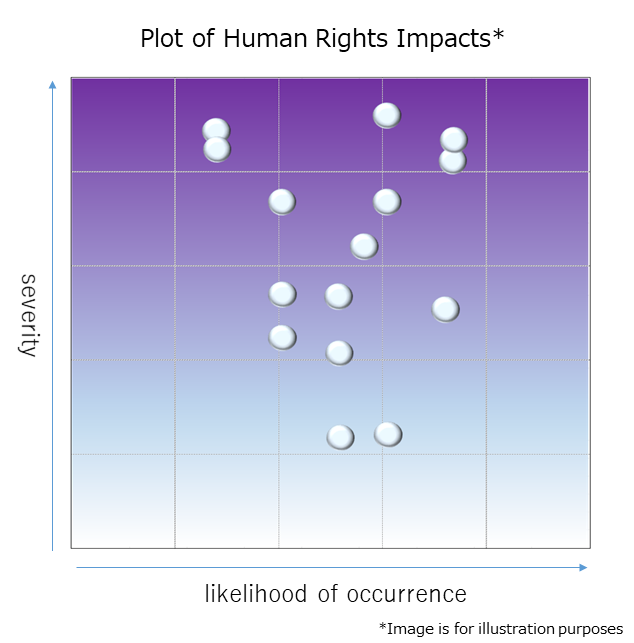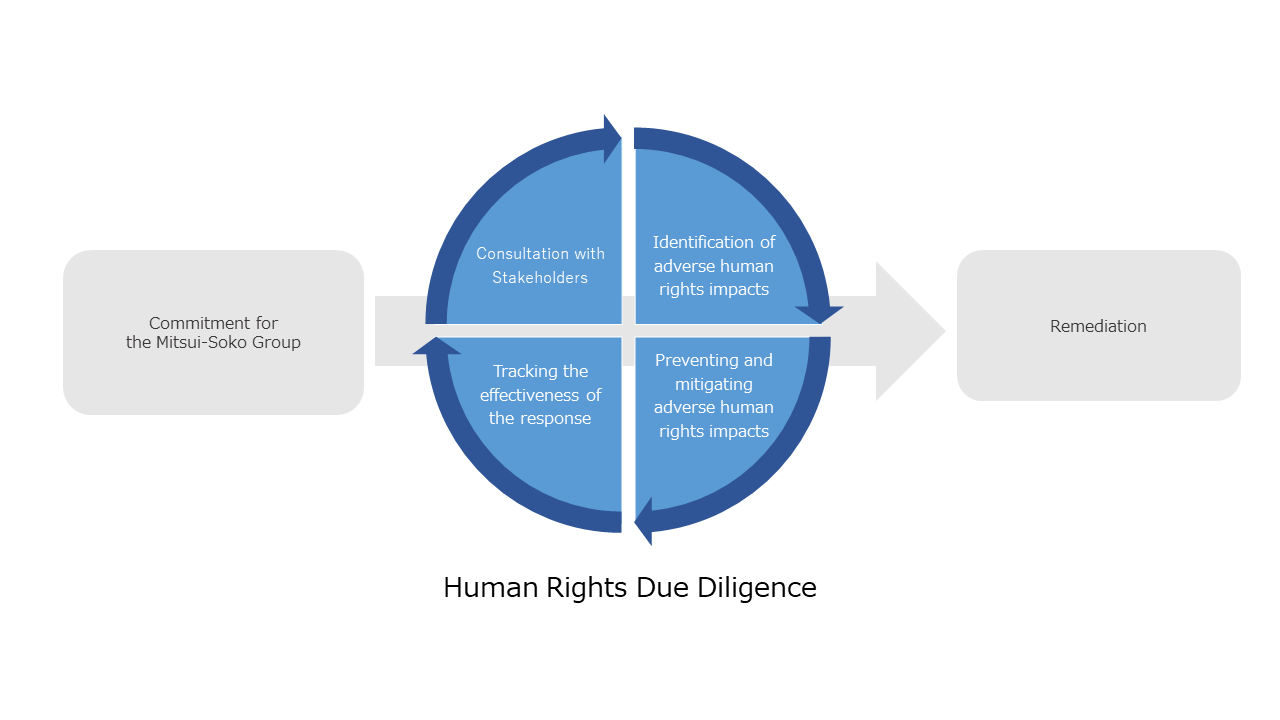Social
Human Rights


Basic Approach to Human Rights
The MITSUI-SOKO Group considers the protection of the dignity and respect for
the rights of all
people in society to be an important element underlying all of its business
activities. In our
efforts, we support and respect international norms on human rights, including
the International
Bill of Human Rights (Universal Declaration of Human Rights, International
Covenant on Civil and
Political Rights, and International Covenant on Economic, Social and Cultural
Rights), the
International Labour Organization (ILO) Declaration on Fundamental Principles
and Rights at Work,
and the OECD Guidelines for Multinational Enterprises, and promote them in
accordance with the
framework of the UN Guiding Principles on Business and Human Rights.
Specifically, we prohibit child
labor and forced labor; respect the right to freedom of association and the
right to collective
bargaining; observe the minimum wage in each country; protect the right to a
living wage, including
the promotion of equal pay for equal work; and eliminate all discrimination
related to race,
nationality, ethnicity (indigenous people), language, gender, and ideology, such
as religious belief
and sexual orientation. We thereby are committed to respecting the human rights
of all our
stakeholders, not just our Group's workers.
We comply with all applicable laws and regulations in the countries and regions
where we operate.
When faced with conflicts between internationally recognized human rights norms
and national and
local laws and regulations, we will seek ways to maximize respect for
internationally recognized
human rights norms. As indicated in the MITSUI-SOKO Group Human Rights Policy
below, this is the
foundation for all of the Group's efforts to respect human rights, and is also
the natural premise
for individual initiatives to respect human rights, such as the prohibition of
child labor and
forced labor, and the protection of the right to a living wage.
Formulation of Human Rights Policy
The Group has formulated the MITSUI-SOKO Group Human Rights Policy (hereinafter
the "Policy") in
compliance with the UN Guiding Principles on Business and Human Rights as a
means of organizing and
expressing to society its stance and initiatives regarding respect for human
rights not only within
the Group but also throughout its supply chain. Based on this Policy, the Group
works with various
parties to respect the human rights of all stakeholders related to its business
activities, fulfills
its social mission, and contributes to the realization of a sustainable society.
The Policy was
developed based on advice from outside experts with expertise and practical
experience in human
rights, and was approved by the Board of Directors. We will continue to engage
in discussions with
stakeholders and outside experts on an ongoing basis, and will reflect the
results of these
conversations in the Policy and respect for human rights initiatives as
necessary.
In order to fulfill our responsibility to respect human rights in accordance
with this Policy, we
implement the Group Basic Procurement Policy to ensure responsible procurement,
and also request our
partners (including subcontractors and other suppliers) to understand and
implement the policy. For
details, please refer to
the
Group Basic Procurement Policy page.
Identification of Key Human Rights Issues
In promoting our commitment to respect for human rights, we have assessed the
impact of our business
activities on the human rights of our stakeholders, and identified the
prohibition of forced labor
and child labor, prohibition of all forms of discrimination, prohibition of
harassment, provision of
a safe working environment, appropriate management of working hours, and
guarantee of rights of
foreign workers as important human rights issues. The following process is used
to identify key
human rights issues, and risk assessments are in progress around the identified
human rights issues.
Since the situation surrounding human rights is constantly changing, we will
review the key human
rights issues based on continuous research, information gathering, and
discussions with stakeholders
and external experts.
Process for Identifying Key Human Rights Issues
-
Step1.
Illustrate the value chain of the Group for each major company and sort out relevant stakeholders and human rights issues. -
Step2.
Examine and evaluate the extracted human rights issues qualitatively and quantitatively in terms of both "severity" and "likelihood of occurrence" in consultation with external experts. -
Step3.
Identify priority human rights issues to be addressed among those examined and evaluated, taking into account their relevance to us.

Implementation of Human Rights Due Diligence
The Group conducts human rights due diligence in order to fulfill its
responsibility to respect
human rights. Human rights due diligence is an ongoing process of investigation,
remediation,
disclosure, and dialogue with stakeholders to identify adverse human rights
impacts in business
activities and supply chains and to prevent, mitigate, and address them. The
Group conducts human
rights due diligence on domestic and overseas Group companies and business
partners, and strives to
resolve human rights issues in conjunction with education and training related
to respect for human
rights and the establishment of an effective remedy system.

For more details on the scope and results of the latest Human Rights Due Diligence,
please refer to
Sustainability Data Book.
Remediation
If it becomes clear that the Group has caused, contributed to or is otherwise
involved in any adverse human rights impacts, the Group will work
to correct and
remedy the situation through appropriate means. All employees of the Group
(employees, fellows,
contract employees, seconded employees, temporary employees, contract employees,
and subcontractor
employees) have anonymous access to the consultation service in the event of
human rights-related
concerns, such as harassment and lack of occupational health and safety.
We will also establish a contact point to receive feedback from everyone
in our supply chain, including our customers and business partners.
Education & Training
With the aim of proactively avoiding and preventing the emergence of significant human rights issues such as child labor, forced labor, and overwork, and mitigating and minimizing their impact, the Group conducts human rights-related education and training.
For more information about the implemented latest Education and Training, please refer to
Sustainability Data Book.
- HOME
- Sustainability
- Human Rights
